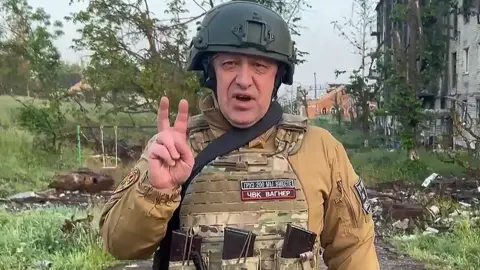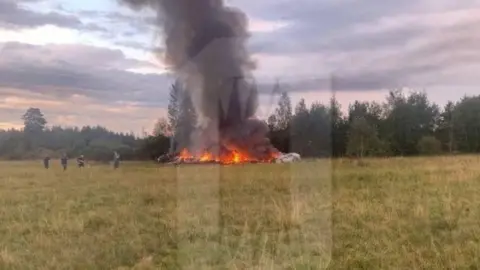Wagner chief Yevgeny Prigozhin presumed dead after Russia plane crash
 Shutterstock
ShutterstockRussian mercenary leader Yevgeny Prigozhin was on the passenger list of a jet which crashed in Russia killing all 10 people on board, Russia's civil aviation authority says.
Social media linked to the Wagner mercenary group say his private plane was shot down by Russian air defences.
Prigozhin died "as a result of actions of traitors to Russia", the Grey Zone Telegram channel posted.
Prigozhin led an aborted mutiny against Russia's armed forces in June.
However, some experts in Russia and abroad suggest the revolt was staged, and Prigozhin abandoned his "justice march" on Moscow after direct orders from President Vladimir Putin.
Wednesday's crash in the Tver region, north-west of the capital Moscow, comes on the same day that senior Russian general Sergei Surovikin was reportedly sacked as air force chief.
Gen Surovikin was known to have good relations with Prigozhin and had not been seen in public since the mutiny.
Prigozhin's aircraft - an Embraer-135 (EBM-135BJ) - was flying from Moscow to St Petersburg on Wednesday with seven passengers and three crew, Russia's Rosaviatsia aviation authority said.
Senior Wagner commander Dmitry Utkin - who founded the group in 2014 - was also on the passenger list, it said.
The plane is reported to have come down near the village of Kuzhenkino, about half-way between Moscow and St Petersburg.
One report said the body of Prigozhin, 62, had been found and identified - this has not been officially confirmed.
All 10 bodies have been recovered, Russia's state-run news agency Interfax said.
Grey Zone said local residents had heard two bangs before the crash and had seen two vapour trails.
Tass news agency said the plane had caught fire on hitting the ground.
The aircraft had been in the air for less than half-an-hour, it added.
An investigation has been launched into the crash and emergency services are searching the scene.
At the same time, Grey Zone reported that a second business jet owned by Prigozhin had landed safely in the Moscow region.
The mercenary group has about 25,000 fighters.
The group has been active in Ukraine, Syria and west Africa, and has gained a reputation for brutality.
Prigozhin headed the mutiny on 23-24 June, moving his troops from Ukraine, seizing the southern Russian city of Rostov-on-Don, and threatening to march on Moscow.
The move came after months of tension with Russian military commanders over the invasion of Ukraine launched by President Putin in 2014.
The stand-off seemed to have been settled by a deal which allowed Wagner troops to move to Belarus or join the Russian army.
Prigozhin himself agreed to relocate to Belarus - but has apparently been able to move freely, making public appearances in Russia and releasing a video of him purportedly in Africa.
 Reuters
ReutersBut several Russia watchers have described him as a "dead man walking" since the mutiny.
President Putin's initial reaction to his challenge to Russia's defence establishment was vitriolic, calling it a betrayal and a stab in the back in a video message on 24 June.
The deal did not mean he was safe.
"Revenge", commented CIA director William Burns, "is a dish Putin prefers served cold" - or words to that effect.
None of this, of course, is proof that Prigozhin and his entourage were deliberately targeted.
But given the circumstances any claims that his demise, if confirmed, was an accident will see a lot of eyebrows raised.
US President Joe Biden said he was "not surprised" by news of Prigozhin's possible death.

